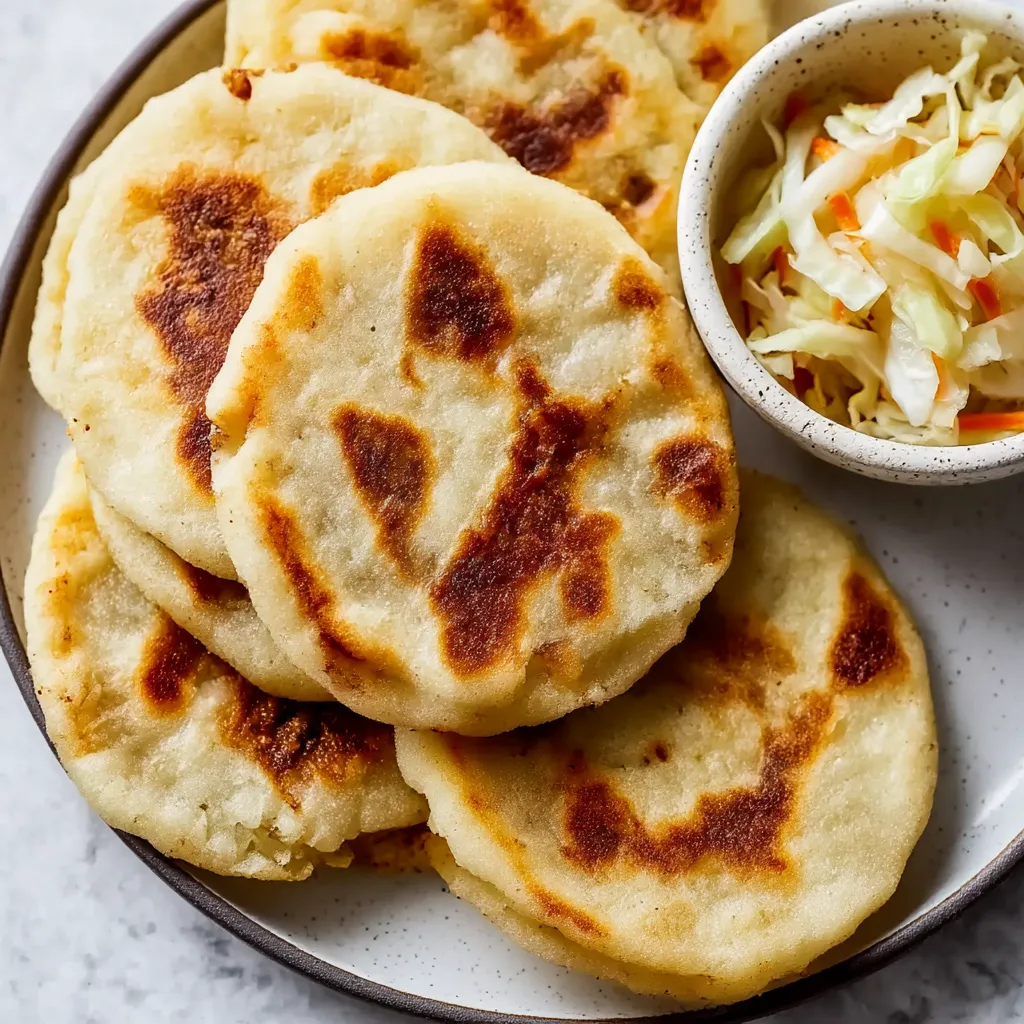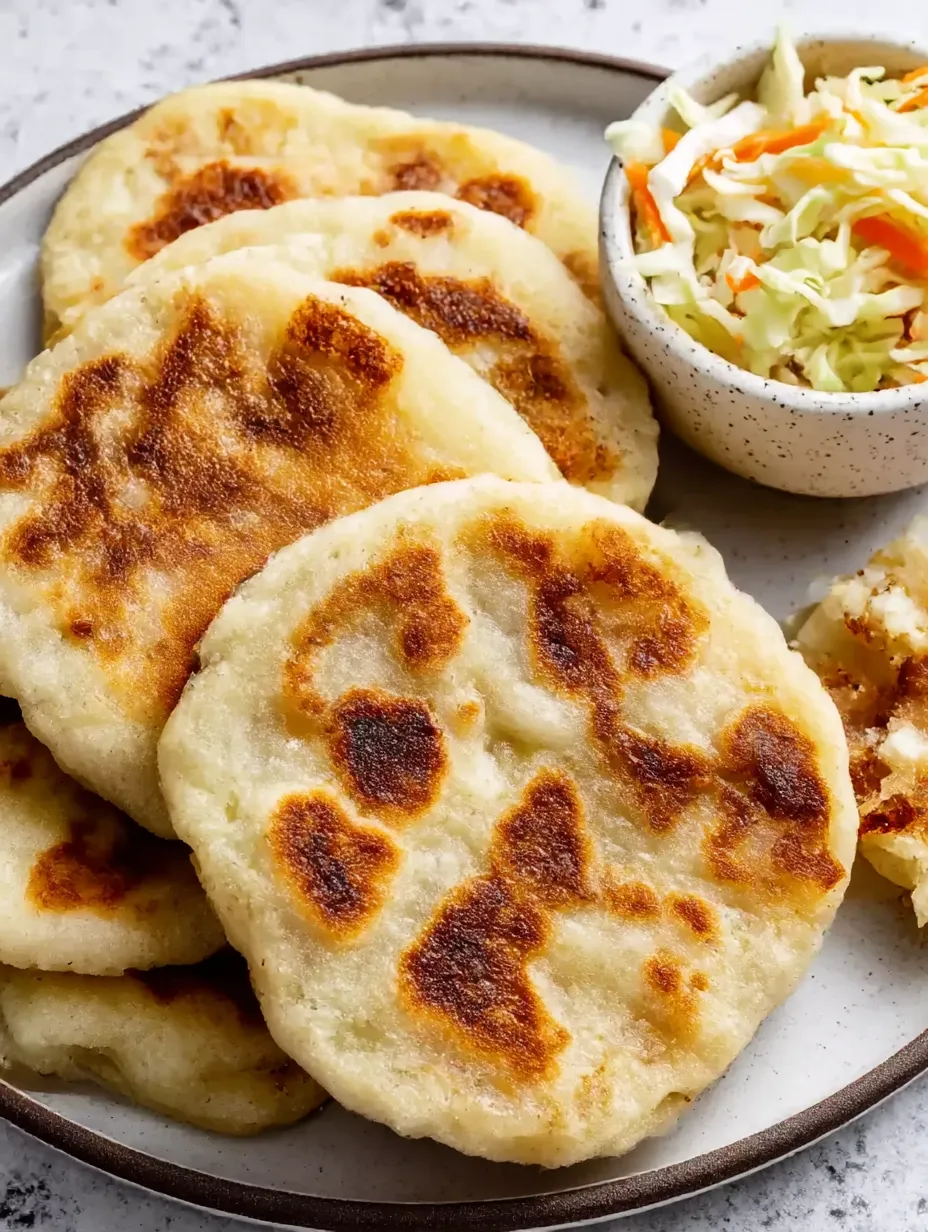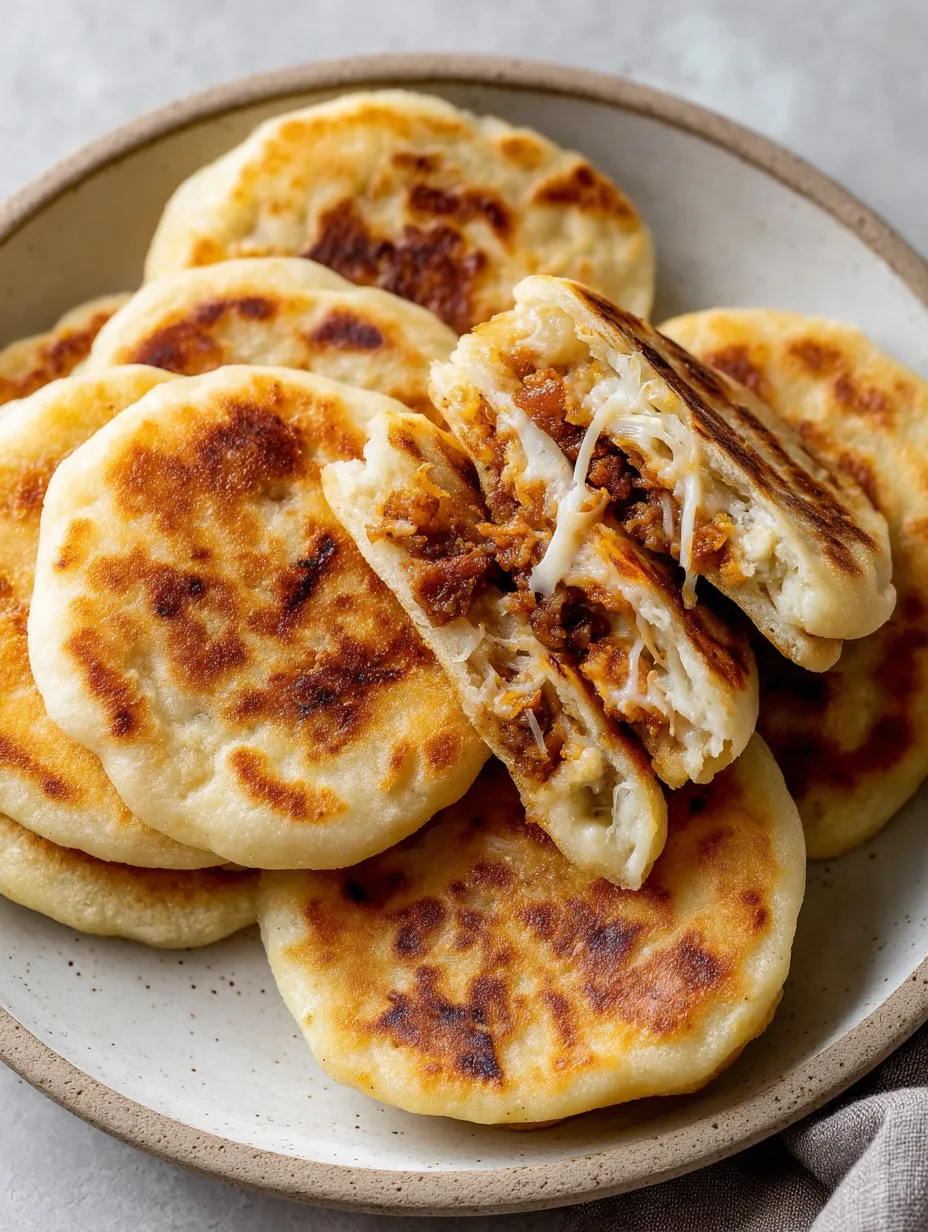 Pin it
Pin it
This traditional Salvadoran pupusa recipe creates pillowy corn tortillas filled with savory beans and melty cheese. I learned this authentic technique from my neighbor whose family brought their recipe straight from El Salvador. The combination of crispy exterior and gooey filling makes these irresistible for any meal or snack.
I first made these during a neighborhood potluck and they disappeared instantly. Now they're my go to comfort food whenever I'm craving something hearty but easy to prepare.
Ingredients
- 3 cups masa harina: creates the authentic corn dough base look for fine ground for best texture
- 2 teaspoon salt: enhances the corn flavor throughout the dough
- 2 ¾ cups warm water: helps activate the masa for proper consistency
- 2 tablespoon avocado oil: provides a neutral flavor for frying
- 15 oz refried beans: form the creamy base of the filling
- 1 packet chicken seasoning: preferably Goya brand for authentic flavor
- 1 cups shredded mozzarella cheese: melts perfectly for that signature stretch
- ½ head green cabbage: forms the base of the curtido slaw
- 1 large carrot: adds sweetness and color to the curtido
- ½ onion: provides sharpness to balance the curtido
- White vinegar: creates the signature tang in the curtido
Step-by-Step Instructions
- Prepare the Curtido:
- Bring a large pot of water to boil and add cabbage until soft. Reserve half cup of water then drain. Combine cabbage with carrot onion salt vinegar and reserved hot water in a bowl. Let sit while preparing pupusas to develop flavors. The longer it sits the more the flavors meld together.
- Mix the Filling:
- Combine refried beans chicken seasoning and shredded cheese in a bowl until fully incorporated. This mixture should be thick enough to stay put when scooped but not so firm it tears the dough. The seasoning adds incredible depth to otherwise simple ingredients.
- Prepare the Dough:
- Add masa harina and salt to a large mixing bowl. Gradually add warm water one cup at a time using your hands to mix thoroughly. The finished dough should feel like play dough smooth and pliable without being sticky. If too dry add a tablespoon of water at a time until perfect consistency is reached.
- Form the Pupusas:
- Take a small handful of dough and flatten into a disc about 4 inches in diameter. Create a shallow depression in the center with your fingers. Add 1 to 2 tablespoons of filling in the center then carefully fold edges up to enclose the filling completely. Gently press between palms to flatten back into a disc about half inch thick ensuring filling stays contained.
- Cook the Pupusas:
- Heat oil in a cast iron skillet over medium heat. Place pupusas in pan without overcrowding cooking 2 to 3 minutes per side until golden brown with crisp edges but still tender in center. The perfect pupusa has slight browning on both sides with a fully melted cheese interior.
- Serve and Enjoy:
- Plate warm pupusas topped with curtido and salsa roja if available. The contrast between warm pupusa and cool tangy curtido creates the perfect bite that Salvadorans have enjoyed for generations.
 Pin it
Pin it
My absolute favorite part is when the cheese slightly oozes out during cooking and creates those crispy cheese edges. My children always fight over these pieces which remind me of how my grandmother would save the crispy bits just for me when I was young.
Storage Tips
Leftover pupusas can be stored in an airtight container in the refrigerator for up to 3 days. The key to reheating is using a dry skillet over medium heat rather than a microwave which can make them soggy. For longer storage freeze formed uncooked pupusas between parchment paper in a freezer bag for up to 3 months. Cook directly from frozen adding just an extra minute per side. Store curtido separately in the refrigerator where it will continue to ferment slightly and develop even better flavor over time.
Troubleshooting Common Issues
If your pupusa dough keeps cracking it likely needs more moisture. Add water one tablespoon at a time until it reaches that perfect play dough consistency. When filling leaks out during cooking you probably overfilled or didnt seal properly. Start with less filling until you master the technique. A common mistake is making pupusas too thin which allows filling to break through try keeping them about half inch thick for best results. Remember that making pupusas is an art that improves with practice each batch will get better as you develop muscle memory for the process.
Cultural Significance
Pupusas are the national dish of El Salvador dating back over 2000 years to pre Columbian times. Originally created by the Pipil tribes they were traditionally filled with flowers and local vegetables. Today they represent cultural pride for Salvadorans worldwide with entire festivals dedicated to celebrating this humble yet beloved food. In 2005 the Salvadoran Legislative Assembly declared the second Sunday of November as National Pupusa Day showing just how important this dish is to national identity. The curtido accompaniment was developed as a way to add brightness and aid digestion making pupusas a complete nutritionally balanced meal.
 Pin it
Pin it
Frequently Asked Questions
- → What is masa harina?
Masa harina is a type of finely ground corn flour treated with limewater, commonly used in Latin American cooking for dishes like tortillas and pupusas.
- → Can I make pupusas gluten-free?
Yes, pupusas are naturally gluten-free since they are made with masa harina, which is a corn-based flour.
- → What is curtido, and how is it served?
Curtido is a Salvadoran pickled slaw made with cabbage, carrots, and onions. It adds a tangy, crunchy accompaniment to pupusas.
- → Can I customize the fillings?
Yes, common variations include zucchini, pork, or a mix of other vegetables and cheese. The filling can be easily adjusted to your preference.
- → What oil should I use for frying?
Avocado oil is recommended for frying, but you can use any neutral oil like vegetable or canola oil.
